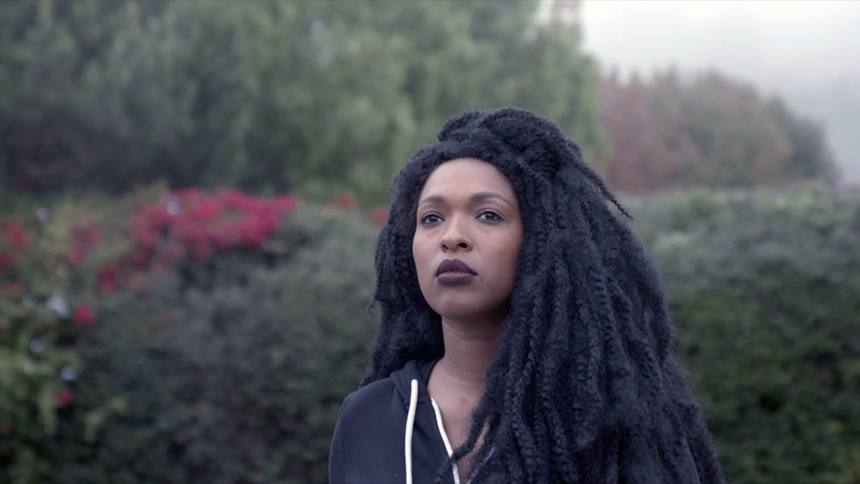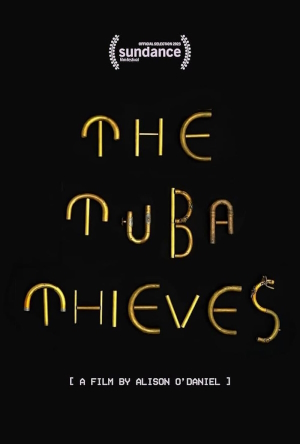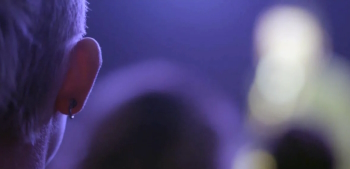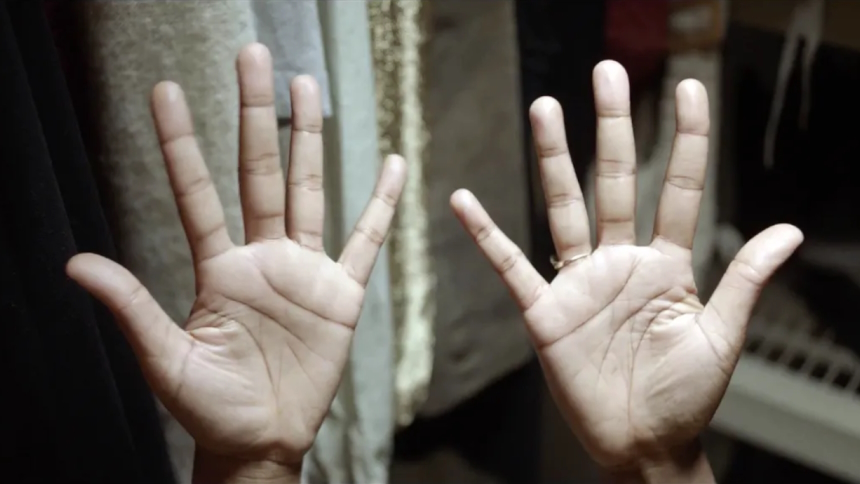International Documentary Festival Amsterdam Review: THE TUBA THIEVES
Alison O'Daniel's docu-drama is an associative masterpiece which gives your brain a workout.

The Thuba Thieves is ostensibly a film about the theft of tuba's from schools in Los Angeles during 2011 and 2013, a series of heists that remain unsolved to this day. It is so much more than that, though: an associative documentary-fiction-essay-film hybrid that explores the myriad ways that sound and vision intersect. A free-flowing exploration of how our abilities and disabilities affect our world, and the ways in which humans interact with their surroundings; also touching on topics of race, class and even the discrepancy between urban sprawl and nature.
The way that Alison O'Daniel, who herself is deaf, explores this, is that she teaches the audience to see sound differently. Not hear, but see, because The Tuba Thieves is heavily reliant on the use of 'closed captions', that are placed in myriad ways on the screen, to emphasize the way sound is used in this film. The effect is sometimes close to watching a late-career Godard film, but with much more of a sense of playfulness and humor. O'Daniel uses color, typeface and even placement on screen to guide the hearing viewer to notice the impact sound has on our world.
 There are myriad other ways in which O'Daniel explores the visibility of sound, going into topics like sonic booms of airplanes, how deaf people experience music, the ripple effect of sound in nature, like on the webbing of spiders (who show up all throughout the film), or even the way that plants and fungi interact with each other through soundwaves. O'Daniel never holds the hand of the viewer, throwing them in the deep end, and leaving them to explore all these myriad ways of seeing and hearing, without overexplaining, or at times even explaining.
There are myriad other ways in which O'Daniel explores the visibility of sound, going into topics like sonic booms of airplanes, how deaf people experience music, the ripple effect of sound in nature, like on the webbing of spiders (who show up all throughout the film), or even the way that plants and fungi interact with each other through soundwaves. O'Daniel never holds the hand of the viewer, throwing them in the deep end, and leaving them to explore all these myriad ways of seeing and hearing, without overexplaining, or at times even explaining.
If you don't know who John Cage is, you will be utterly lost by the re-enactment of the first performance of his completely silent piece 4"33, or if you don't know the importance and history of The Deaf Club, you will be lost why O'Daniel spends so much time in a punk-rock-venue. There are associative moments that seem even more esoteric, like a whole subplot about the genre of the narcocorrido, a genre of Mexican music that focuses on the subject of crime and uses a lot of tuba as an instrument. It seems mostly there as a connection to the title, the subject of which was only a starting point to explore larger notions of the way in which sound or (after the theft of instruments) the lack of it, alters our view of the world.
Eventually this also becomes a film about the subject of Los Angeles, itself a city in which narcocorridos are ever popular on the radio, but where there also are a lot of planes flying overhead, another throughline in the story of how the buzz of a city can affect our mental well being. This becomes a story about how being poor in a rich city can literally affect your access to silence and musical instruments. It also becomes a story about how being a deaf person in a hearing world can affect your future prospects, or the way you interact with music.
There's also the story of the main character, Nyke, a pregnant deaf black woman in a relationship with a white deaf poet, who in one of the stories most captivating scenes talks with her father, a janitor, about how being deaf makes her fear for the future of her daughter, as she might not hear the fire alarm, or a cop knocking. She is the heart of the film, as is the relationship with her husband, Nature Boy, who in another brilliant scene sabotages a hearing test, by making a 'spoken word' poem of all the words he is supposed to hear. But which he memorized, because the test never changed since he was a kid. The way in which he emphasizes his use of American Sign Language, to drive his words home, made me, as a hearing person, appreciate the intricacies and poetry in the movement of that language.
 There also seems to be an undercurrent in which O'Daniel uses the whole of the screen for the 'closed captions', making the audience pay attention to the entirety of the screen. The use of written language all throughout the film, also on school marquees and ticker tape displays, make us pay attention. We have to work and read. We have to pay attention to detail. We have to make connections. We have to use all of our senses to keep up. I have a feeling O'Daniel wants to emulate the heightened experience of looking, as a deaf person needs to do. And she seems to reverse the roles between a hearing audience and a deaf audience, having many scenes of subtitled American Sign Language scenes, that are so heavy on the information, that a hearing audience might feel lost. This is the rare film in which people with disabilities, be it a deaf person, or as in my case, a neurodivergent person, whose brain is wired to make associations and pay attention to detail, have a leg up over an abled neurotypical audience member.
There also seems to be an undercurrent in which O'Daniel uses the whole of the screen for the 'closed captions', making the audience pay attention to the entirety of the screen. The use of written language all throughout the film, also on school marquees and ticker tape displays, make us pay attention. We have to work and read. We have to pay attention to detail. We have to make connections. We have to use all of our senses to keep up. I have a feeling O'Daniel wants to emulate the heightened experience of looking, as a deaf person needs to do. And she seems to reverse the roles between a hearing audience and a deaf audience, having many scenes of subtitled American Sign Language scenes, that are so heavy on the information, that a hearing audience might feel lost. This is the rare film in which people with disabilities, be it a deaf person, or as in my case, a neurodivergent person, whose brain is wired to make associations and pay attention to detail, have a leg up over an abled neurotypical audience member.
I was reminded of a quote of Wim Wenders in a recent interview about his film Perfect Days: "Every film teaches us its own perception. Some films teach us to see carelessly, others show us how to see with a loving look.". The Tuba Thieves teaches the audience to 'read the film' in a very different way. To let go of all notions of narrative. To pay attention to the way sounds are emphasized. It teaches us to see and hear carefully. But even more so, it teaches us to view the world itself in a different way. To be aware of the differences and similarities between each other. To see the ways in which who we are, where we live, what our social class is, our race is, or what our (dis)abilities are, does fully affect the way we perceive the world. A world which we all share.
Film is called 'the empathy machine', at times, and while I fully agree with that statement, I never felt it so powerfully as with The Tuba Thieves. It is, bar none, the best film of 2023; one that really pushes the boundaries of what film can do and say, and show us new ways of saying it.

The Tuba Thieves
Director(s)
- Alison O'Daniel
Writer(s)
- Alison O'Daniel
Cast
- Nyeisha Prince
- Geovanny Marroquin
- Russell Harvard







